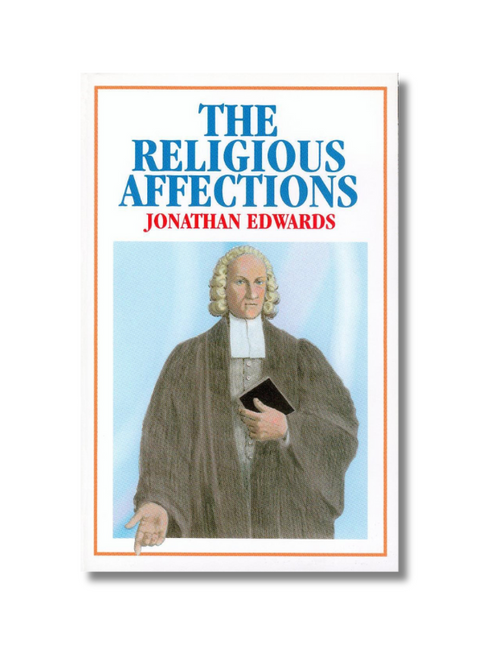Product Description
Jonathan Edwards was one of the few truly great theologians of the English-speaking world, an intellectual and spiritual giant. When he began his ministry at Northampton, Massachusetts, New England had drifted from the Puritanism of its founders. Resisting the current trend, Edwards preached the whole counsel of God, and God plainly honoured his testimony. Yet to all appearances his life ended in tragedy; voted out of his pastorate by the people of Northampton, he died of fever at Princeton, only two months after taking over as President of the College. Edwards is perhaps best known as the theologian of revival, a subject on which he was uniquely qualified to write, by reason of his theological grasp and a first-hand experience of awakenings. Of his several treatises in this field, The Religious Affections ranks as the ‘magnum opus’.
The author’s object in this book is to distinguish between true and false religion by showing the marks of a saving work of the Holy Spirit in men. In his Preface, Edwards stresses the importance of using ‘our utmost endeavours clearly to discern…wherein true religion does consist’. For ’till this be done, it may be expected that great revivings of religion will be but of short continuance’.
Paperback, 382 pages
Original Publication Date: 1746
Banner Publication Date: April 1961
TABLE OF CONTENTS
Publishers’ Note
Introduction by Alexander Smellie, D.D.
The Author’s Preface
1. Part I
CONCERNING THE NATURE OF THE AFFECTIONS AND THEIR IMPORTANCE IN RELIGION
Section I. True Religion largely consists in Holy Affections
II. Evidence that True Religion lies much in the Affections
III. Inferences from the Doctrine
2. Part II
SHOWING WHAT ARE NO CERTAIN SIGNS THAT RELIGIOUS AFFECTIONS ARE TRULY GRACIOUS, OR THAT THEY ARE NOT
Section I. That Religious Affections are very great is no Sign
II. Great effects on the Body are no Sign
III. Fluency and Fervour are no Sign
IV. That they are not excited by us is no Sign
V. That they come with Texts of Scripture is no Sign
VI. That there is an appearance of Love is no Sign
VII. That Religious Affections are of many kinds is no Sign
VIII. Joys following in a certain Order are no Sign
IX. Much Time and much Zeal in Duty are no Sign
X. Much expression of Praise is no Sign
XI. Great Confidence is no certain Sign
XII. Moving Testimonies are no Sign
3. Part III
SHOWING WHAT ARE DISTINGUISHING SIGNS OF TRULY GRACIOUS AND HOLY AFFECTIONS
Introductory Remarks
Section I. Gracious Affections are from Divine Influence
II. Their Object is the Excellence of Divine Things
III. They are founded on the moral Excellency of Objects
IV. They arise from Divine Illumination
V. They are attended with a Conviction of Certainty
VI. They are attended with Evangelical Humiliation
VII. They are attended with a Change of Nature
VIII. They beget and promote the Temper of Jesus
IX. Gracious Affections soften the Heart
X. They have beautiful Symmetry and Proportion
XI. False Affections rest satisfied in Themselves
XII. Religious Affections have their fruit in Christian Practice
(1) Christian Practice is the chief Sign to Others
(2) Christian Practice is the chief Sign to Ourselves
Endorsements
‘This is an uncomfortable book. Edwards wrote this book against the backcloth of the awakenings in the 1730s-40s. He’s aware of the extremes that the mighty work of God had produced; where God is at work, Satan will be at work, and Edwards very honestly acknowledges the excesses. But what he does here is to open up the Scriptures and to highlight evidences that appear to be gracious evidences, but are actually not gracious evidences – and then he looks at evidences that truly are gracious evidences. Now, he is not seeking to crush people with little faith that is yet saving faith, but he wants people to understand that where the Gospel of grace takes root in someone’s life, it always produces Godly affections. So he begins his treatise with this; “True religion in great part consists in godly affections.” It’s a remarkable read.’ — IAN HAMILTON
Author
Jonathan Edwards was a Christian preacher and one of the greatest theologians of the English-speaking world. He played a critical role in the First Great Awakening and oversaw some of the first revivals in 1733 at his church in Northampton, Massachusetts. Edwards' famous sermon, "Sinners in the Hands of an Angry God," remains a classic of early American literature.








